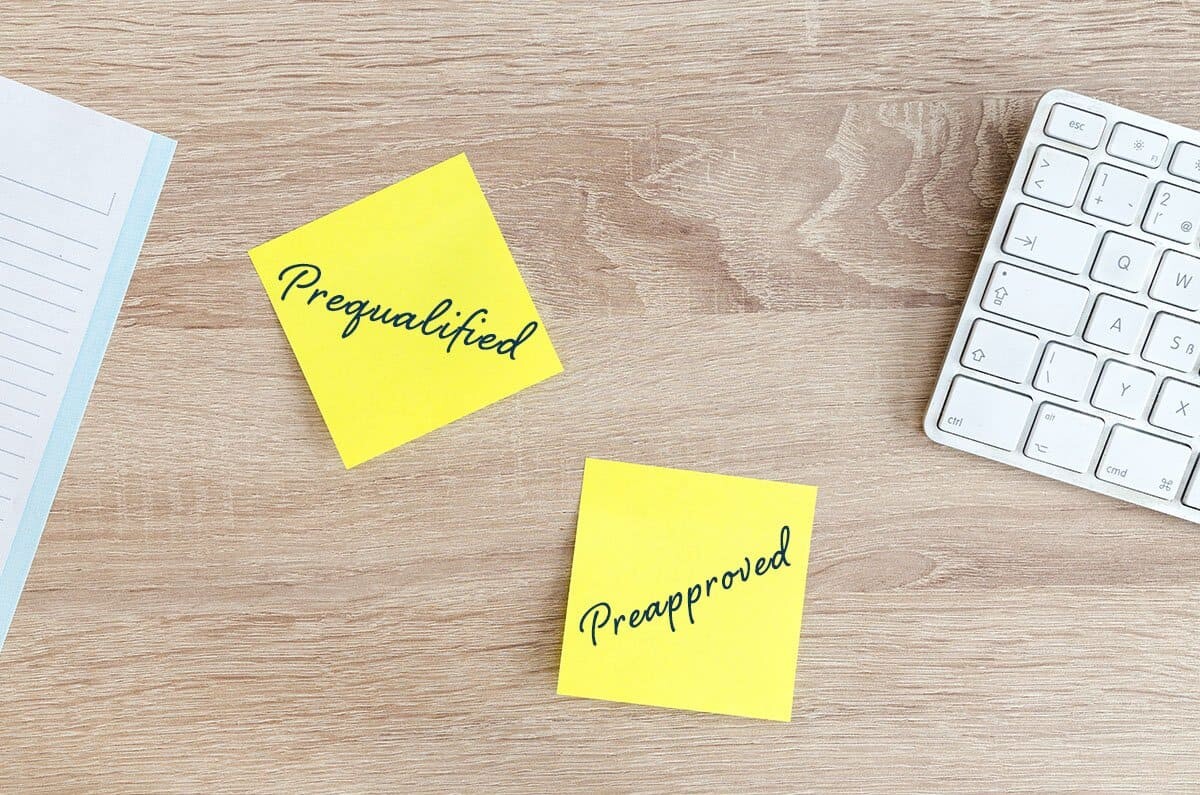Prequalification vs. PreApproval
Prequalification and preapproval are two important real estate finance terms. Unfortunately, these terms often get confused. The difference is important as it describes a lender’s actual level of commitment to a home buyer. Interchanging these terms can create problems during the home buying process.
Prequalification Explained
Think of Prequalification as the initial first steps in The Steps to Buying a House. At the mortgage prequalification stage, you are trying to find out if you can get a loan to buy a house.
To do this, the lender needs to answer these three questions:
- How does your credit look?
- How much house can you afford?
- What type of loan will you be using?
Credit will be the primary factor that determines which type of loan you can get and if you can get a loan at all.
The lender will start by pulling your credit report. The lender wants to see a score of 620 or higher for a conventional loan. Even with a 620 credit score, you’ll be paying a higher interest rate on a conventional loan. 770 is where the conventional loans interest rates start to look good.
Additionally, a conventional loan will in most cases require a larger down payment. This is why FHA loans are so popular. With a 620 credit score on an FHA loan, the borrower will see a lower interest rate while putting less money down.
Loan Limits
The downside to an FHA loan is they have limits. These limits are different for different MSA’a (metropolitan statistical areas) or Counties. Your lender and REALTOR® will know your upper loan limits.
The next limiting factor of an FHA loan is going to be property type. Not all Common Interest Communities, usually Condo and Townhome developments are FHA approved. So, if you are looking in a Common Interest Community, it’s important to make sure the community is on the FHA approved list. This is something your REALTOR® and/or lender will help with. The point is this, each loan has different limitations and requirements. The time to learn about these limitations is during the prequalification process.
When you finish getting prequalified, you should walk away knowing the following:
- What type of loan are you going to get? Conventional, FHA or VA.
- How much cash, if any will you need to put down.
- What’s the plan for paying closing costs.
- Any limitations on the type of property you can buy.
At this point it’s safe to start looking at houses. We like to see buyers move towards pre-approval at this point. Here’s why, when a home seller accepts an offer on their home, they’re actually taking the house off the market. If the loan is not approved, the sale will not close. Many home sellers get emotional about this and try to keep earnest money. If the Buyer’s Agent did their job, the earnest money will come back to the buyer but after a lot of stress and drama. The best practice is to move forward with Preapproval.
Preapproval
Pre-approval involves a full blown loan application. At this point the lender will:
- Take the application
- Request supporting documentation
- Begin the process of verifying all that data.
The lender has to make sure the loan file complies with the guidelines of the entity that will buy the loan. This would be a company like Fannie Mae, Freddie Mac or Ginnie Mae. Lenders sell their loans, thereby recouping money to re-lend. If the loan doesn’t comply, the auditor will send the loan back to the lender. This ends up decreasing the capital they ultimately have to lend.
Application Checklist
To complete the application, you will need the following:
✓ W2 from the past two years
✓ Pay stub for the past month
✓ Tax returns from the past two years
✓ Checking or savings bank statements for the past three months (this will likely have your down payment funds in them as well)
✓ Statements for all your other assets (stocks, bonds, retirement accounts) for the last two months
✓ Name and phone number of your landlord (if you are renting) or your current mortgage documents
✓ Divorce decree, if applicable
✓ For the self-employed: Your business tax returns for the past two years in addition to your year-to-date profit and loss statement and year-to-date balance sheet
✓ Credit Report and Credit Score
Pre-approval is the lender’s commitment that you qualify for a particular loan type and amount based on your income and credit.
If everything looks good, the lender will generate a pre-approval letter and a “Good Faith Estimate of Settlement Costs”. These are important documents to have when shopping for a home as they prove to both sellers and their agents that you have the means to buy their house. These documents are generally good for 60 to 90 days.
The approval letter is a letter from the lender stating that based on the information they have, you qualify for a loan. This letter also gives the amount of the loan you qualify for.
A good faith estimate is a standard form that outlines and discloses the fees associated with your loan. Lenders are required to provide this document, you can read more about it here: Good Faith Estimate
At this point, you are “pre-approved”. The lender waits for us to send them a contract for a particular property. At that point, they start to work on getting a full loan commitment. Full Loan Committmitment Requires:
- Contract on Property
- Appraisal on the property
- In some cases, the Inspection Report
- Updated paycheck stubs for the months before closing.
- Bank statements for the months before closing.
Pre-approval is the lender’s way of saying they are willing to loan this person X amount of money. It now depends on the house they want to buy. The appraisal, and in some cases the inspection report of the property, will determine if the lender is able to make a full loan commitment to the buyer. In other words, are they loaning on a good investment? If the buyer defaults and the lender has to take the property back, will the lender be able to resell it for the amount they loaned on it?
No matter what type of market, it’s always wise to start the home buying process with prequalification and preapproval. This path gives you, the buyer, more leverage.
Here are some really helpful articles from other Real Estate Professionals that discuss the importance of the loan process:
Luke Skar – What is a Mortgage Pre-Approval Vs Pre-Qualification?
Paul Sian – Why Every Home Buyer Needs A Mortgage Pre-Approval
Bill Gassett – Difference Between Mortgage Pre-approval vs Pre-qualification Letter

